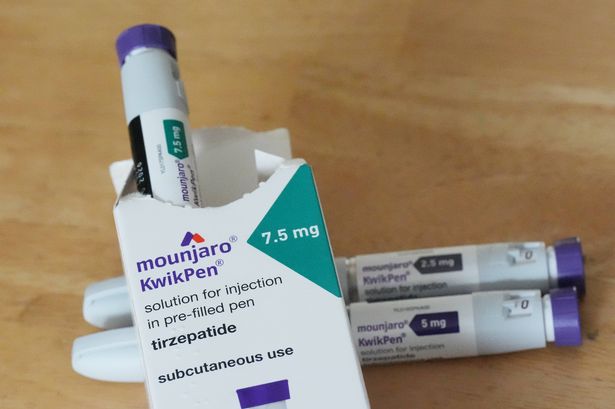Health
GPs Face Rising Workload as Patients Demand Mounjaro Access

General practitioners (GPs) in the UK are experiencing a significant increase in their workload as patients seek access to the weight-loss medication Mounjaro. A recent survey indicates that discussions about the drug now occur in approximately one in 25 consultations, either as the primary reason for the visit or as an additional topic when addressing other health concerns.
Research released earlier this month revealed that many individuals who could benefit from Mounjaro on the National Health Service (NHS) are currently missing out due to funding limitations and inconsistencies in availability across different regions. According to data from the British Medical Journal (BMJ), only 18 out of 42 commissioning bodies in England have begun prescribing Mounjaro in accordance with health service guidance.
NHS England has implemented a phased rollout of Mounjaro, projected to unfold over a span of up to 12 years. Despite this plan, many eligible patients remain unable to access the medication. Currently, the vast majority of patients are purchasing Mounjaro privately, exacerbating health inequalities.
The survey conducted by Pulse magazine and Nursing in Practice found that nearly 10% of GPs and practice nurses report patients bringing up Mounjaro in as many as one in ten consultations. One GP described a “huge influx” of patients expressing interest in the drug. However, many GPs are unable to prescribe it because local Integrated Care Boards (ICBs) have yet to establish the necessary pathways for prescribing and patient support.
One GP recounted that following the rollout’s commencement on June 23, 2023, patients rapidly began inquiring about Mounjaro. They noted the lack of a pre-existing plan from their local ICB, stating, “It would have helped if that had been done before media announcements.” This situation has led to increased administrative burdens, diverting time from treating other patients.
Concerns are growing regarding patients who may need to transition from private purchases to NHS prescriptions. One GP warned of an impending surge in patients seeking continued access to the medication, saying, “I can no longer afford it.”
Sofia Lind, editor of Pulse magazine, highlighted the issue of GPs managing increased patient demand without the necessary infrastructure in place. She remarked, “This is yet another example of GPs being left to pick up the workload when national announcements are made but the infrastructure isn’t in place.”
The BMJ study emphasized that only nine ICBs have sufficient funding to provide for at least 70% of their eligible patients. Alarmingly, four ICBs reported receiving funding that covers only 25% or less of their eligible patient population. For instance, the ICB in Coventry and Warwickshire received funding for just 376 patients, despite identifying 1,795 eligible individuals in the initial rollout year.
Eligible patients include those with a body mass index over 40 and additional health complications such as high blood pressure, obstructive sleep apnoea, cardiovascular disease, and type 2 diabetes.
A spokesperson for the Department of Health and Social Care stated, “We expect NHS integrated care boards to be making these drugs, which can help tackle the obesity crisis, available as part of the phased rollout.” The spokesperson emphasized the commitment to ensure that those in greatest need can access these essential treatments.
Health Secretary Wes Streeting has pledged to make strides in preventing individuals from being “priced out” of accessing weight-loss medications. He expressed the goal of expanding NHS access to Mounjaro following reports of price increases in the private sector.
Dr. Charlotte Refsum, director of health policy at the Tony Blair Institute for Global Change, stressed the necessity for the NHS to reassess access to weight-loss drugs. She noted that the requirement for a GP consultation, along with stringent care protocols that can be costly, creates barriers for patients who stand to benefit most from such treatments.
Dr. Refsum advocated for innovative digital delivery models to improve the affordability and accessibility of these medications. She concluded, “If patients cannot access them on the NHS, this will widen inequalities, allowing those who can afford to pay privately to do so while others miss out on the potential health benefits.”
As discussions around Mounjaro intensify, the challenges facing GPs and patients alike highlight the critical need for a systematic approach to healthcare access in the evolving landscape of obesity treatment.
-

 Health2 months ago
Health2 months agoNeurologist Warns Excessive Use of Supplements Can Harm Brain
-

 Health2 months ago
Health2 months agoFiona Phillips’ Husband Shares Heartfelt Update on Her Alzheimer’s Journey
-

 Science2 weeks ago
Science2 weeks agoBrian Cox Addresses Claims of Alien Probe in 3I/ATLAS Discovery
-

 Science2 weeks ago
Science2 weeks agoNASA Investigates Unusual Comet 3I/ATLAS; New Findings Emerge
-

 Science2 weeks ago
Science2 weeks agoScientists Examine 3I/ATLAS: Alien Artifact or Cosmic Oddity?
-

 Entertainment4 months ago
Entertainment4 months agoKerry Katona Discusses Future Baby Plans and Brian McFadden’s Wedding
-

 Science1 week ago
Science1 week agoNASA Investigates Speedy Object 3I/ATLAS, Sparking Speculation
-

 World2 months ago
World2 months agoCole Palmer’s Cryptic Message to Kobbie Mainoo Following Loan Talks
-

 Entertainment3 months ago
Entertainment3 months agoEmmerdale Faces Tension as Dylan and April’s Lives Hang in the Balance
-

 Science1 week ago
Science1 week agoNASA Scientists Explore Origins of 3I/ATLAS, a Fast-Moving Visitor
-

 Entertainment4 months ago
Entertainment4 months agoLove Island Star Toni Laite’s Mother Expresses Disappointment Over Coupling Decision
-

 Entertainment2 months ago
Entertainment2 months agoMajor Cast Changes at Coronation Street: Exits and Returns in 2025









